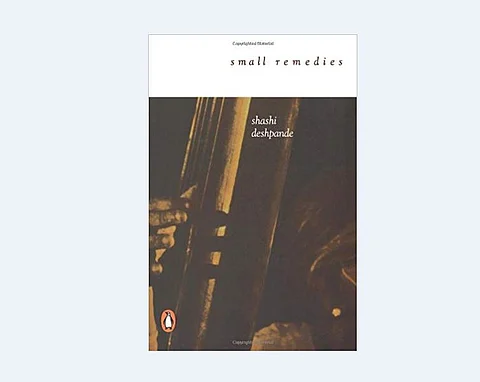
- Home
- Live Blog
- Breaking News
- Top Headlines
- Cities
- NE News
- Sentinel Media
- Sports
- Education
- Jobs

Book Review
By Shashi Deshpande
This book reflects the story of a few women, and their struggles of life. Their lives amalgamate, and each one deals with her own personal anguish. This story works on different stratas of life; personal, worldly, feminist views, women’s rights, communalism, motherhood, and more. A mixture of emotions, including those attached with death and dying.
The book is in a first person narrative by the protagonist, “Madhu” who is a freelance journalist. She lost her son due to the communal incident, 1992 Ayodhya Babri Masjid bombing. To recover, she travels to a town to write a biography of Savitribai, a woman whotook a bold decision to leave Brahim to live with her Muslim husband and sing raga. While writing about Savitribai, she lived in Bhavanipur and searches for the true meaning of her life.
Madhu was born and brought up at Neemgaon. She lost her mother early in life. It is her doctor father, in that quaint little town, who brings up Madhu. She lives with father and a male servant in a house near Savithribai’s house. Munni, who lives next door with her mother Savithribai, becomes her best friend. Savithribai lives in the house with her daughter Munni and the Muslim Tablamaster Ghulam. Earlier she runs away with Ghulam taking Munni with her, from her house and a Hindu husband, to pursue a career in Music. Madhu’s father never observed any festivals or pujas. He was a habitual drinker and a smoker. She did not find this odd, on the contrary, she felt secure with the smells of tobacco and alcohol that her father was with her. Madhu compares how society treats a single woman and a man. Community closely scrutinizes Savithribai, for the goings on in her house. No such problems are there for her widower father. He could drink, smoke and entertain females in his house. After her graduation and death of her father, she marries her friend Som.
A freelance journalist married to Som. She has a son Adit, born 2 years after her wedding. She brings him up by consulting a useful book “Small Remedies” for most of the child’s ailments. Unfortunately, her son Adit dies in a mob violence when he is 17 years old. She grieves her loss alone and holds herself responsible for it. She has a satirical take on the religious rituals, like pooja, we do to stave off evil and illness. She says such “small remedies” do not work. We have to believe that disasters in life are part of the package. Unless one is ready to accept sorrow, one cannot enjoy happiness. However, it is ironical that is real life, would we accept that happiness is ephemeral and sorrow is waiting round the corner. No, we always think that happiness will last forever. (Page 83)
20 years of marriage pass by with lots of happiness and a tragedy. However, nothing prepares her for what was to happen then. She has faint memories that when she was a child, a friend of her father had sexually touched her once. That man later on committed suicide out of regret. When she tells this to Som casually, he starts acting cold to her, pushing aside their 20 years of happy married life. She feels isolated and lonely by this cold treatment from Som. In fact, she was desperately expecting support and comfort from Som after their son’s demise.
Disillusioned, she leaves Som and starts a life on her own as a journalist. Her Father’s sister Leela and her husband Joe, want her to study more. She is determined to work. Joe’s friend Hamid Merchant offers her a job in his small magazine “City Views”. Senior staff Dalvi does not like her and always behaves viciously when Hamidbhai is not around. Hamidbhai is very happy with her work. However, he falls sick and Madhu decides to leave that job rather than work with Dalvi.
Her friends Yogi and Maya want her to write a biography of a famous women singer Savithribai Indorekar who is past her prime. She lives in a rent-free bungalow provided by Ravi Patil, one of her ardent fan in Bhavanipur. Savithri Bai is Madhu’s grandmother Leela’s sister. Leela is married to Joe who has a daughter Paula by previous marriage. Paula stays abroad. However, when she comes home and finds Madhu she creates trouble for her day in and day out. Finally, Madhu moves out to a hostel.
Shashi Deshpande, an award-winning Indian novelist, is the daughter (second) of Sriranga, an eminent Kannada dramatist and writer. She was born in Karnataka. She got her education in Bombay (which is now Mumbai) and Bangalore. She has degrees in Economics and Law. When she was in Mumbai, she pursued journalism studies at the Bharatiya Vidya Bhavan, and then worked for a few months as a journalist for “Onlooker”, a magazine. Her first collection of stories was published in 1978. Her first novel is “The Dark Holds No Terror”, which was published in 1980. She was conferred with the Sahitya Akademi Award for the novel “That Long Silence”, in 1990 and the Padma Shri award in 2009.Shashi Deshpande has written four children’s books, a number of short stories, and nine novels, besides several perceptive essays, now available in a volume entitled Writing from the Margin and Other Essays.
Publisher: Penguin
Available on: Amazon India Price:Rs 359 (Paperback)